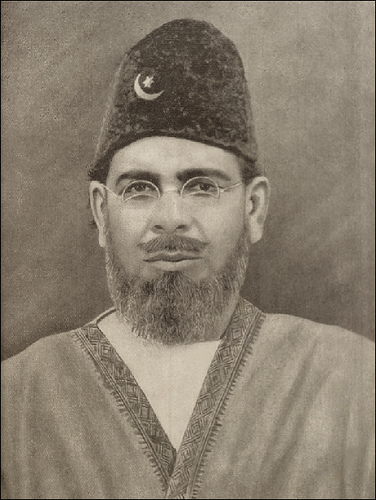Mohammad Ali Jouhar
(10 December 1878 – 4 January 1931)
Mohammad Ali Jouhar (10 December 1878 – 4 January 1931) was an Indian Muslim leader, activist, scholar, journalist and poet, and was among the leading figures of the Khilafat Movement.

He was the sixth Muslim to become the President of Indian National Congress and it lasted only for few months. He was one of the founders of the All India Muslim League and he was also the former president of the All India Muslim League.
Early Life
Mohammad Ali, also known as Maulana Mohammad Ali Jauhar (مَولانا مُحمّد علی جَوہر), was born in 1878 in Rampur, India.He came from the Yousaf Zai clan of the Rohilla tribe of Pathans in Rohilkhand. He was the brother of Maulana Shoukat Ali Jouhar and Zulfiqar Ali. Despite the early death of his father, Jouhar attended the Darul Uloom Deoband, Aligarh Muslim University and, in 1898,Lincoln College, Oxford University, studying modern history.
Upon his return to India, he served as education director for the Rampur state, and later joined the Baroda civil service. He became a writer and orator, contributing to major English and Indian newspapers, in both English and Urdu. He launched the Urdu weekly Hamdard and English Comrade in 1911. He moved to Delhi in 1913.
Jouhar worked hard to expand the AMU, then known as the Mohammedan Anglo-Oriental College, and was one of the co-founders of the Jamia Millia Islamia in 1920, which was later moved to Delhi.
Khilafat and Political activities
Jouhar had attended the founding meeting of the All India Muslim League in Dhaka in 1906, and served as its president in 1918. He remained active in the League till 1928.
He represented the Muslim delegation that travelled to England in 1919 in order to convince the British government to influence the Turkish nationalist Mustafa Kemal not to depose the Sultan of Turkey, who was the Caliph of Islam. British rejection of their demands resulted in the formation of the Khilafat committee which directed Muslims all over India to protest and boycott the government.
Now accorded the respectful title of Maulana, Ali formed in 1921, a broad coalition with Muslim nationalists like Shaukat Ali, Maulana Azad, Hakim Ajmal Khan, Mukhtar Ahmed Ansari and Indian nationalist leader Mahatma Gandhi, who enlisted the support of the Indian National Congress and many thousands of Hindus, who joined the Muslims in a demonstration of unity. Jouhar also wholeheartedly supported Gandhi's call for a national civil resistance movement, and inspired many hundreds of protests and strikes all over India. He was arrested by British authorities and imprisoned for two years for what was termed as a seditious speech at the meeting of the Khilafat Conference.
He was elected as President of Indian National Congress in 1923.
Alienation from Congress
Jouhar was however, disillusioned by the failure of the Khilafat movement and Gandhi's suspension of civil disobedience in 1922, owing to the Chauri Chaura incident.
He re-started his weekly Hamdard, and left the Congress Party. He opposed the Nehru Report, which was a document proposing constitutional reforms and a dominion status of an independent nation within the British Empire, written by a committee of Hindu and Muslim members of the Congress Party headed by President Motilal Nehru. It was a major protest against the Simon Commission which had arrived in India to propose reforms but containing no Indian nor making any effort to listen to Indian voices.
Mohammad Ali opposed the Nehru Report's rejection of separate electorates for Muslims, and supported the Fourteen Points of Muhammad Ali Jinnah and the League. He became a critic of Gandhi, breaking with fellow Muslim leaders like Maulana Azad,Hakim Ajmal Khan and Mukhtar Ahmed Ansari, who continued to support Gandhi and the Indian National Congress. Mohammad Ali said: "Even the most degraded Muhammadan was better than Mahatma Gandhi.
Ali attended the Round Table Conference (The chairman being Sir Agha Khanof the Muslim delegation) to show that only the Muslim League spoke for India's Muslims. He died soon after the conference in London, on January 4, 1931 and was buried in Jerusalem according to his own wish. The inscription written on his grave near the Dome of the Rock says: “Here lies al-Sayyid Muhammad Ali al-Hindi.
Jouhar died at a time when the Pakistan movement had not been formed, and it is a matter of continuing debate if he would have ever supported the idea.
Legacy
Various places have been named after Jouhar. These include:
§ Muhammad Ali Road in south Mumbai , India
§ The Gulistan-e-Jauhar (گلستانِ جوهر) neighborhood of Karachi, Pakistan
§ Mohammad Ali Co-operative Housing Society (M.A.C.H.S.) in Karachi
§ Johar Town in Lahore, Pakistan
§ Jauharabad, a city in Punjab, Pakistan
§ The Jauharabad area in Karachi
§ Maualana Muhammad Ali mosque in Singapore
§ Gandhi Muhammad Ali Memorial Inter College, a Senior Secondary School in Bilthera Road town of Ballia district, Uttar Pradesh, India.
§ Mohammad Ali Jauhar University, Rampur, Uttar Pradesh, India.